Trimming Guide: How To Trim Your Cannabis Flowers
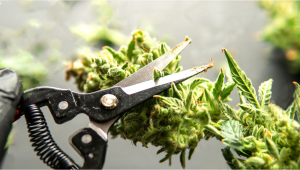
- 1. Why trim our buds?
- 2. What materials do i need to trim?
- 3. How to trim your buds?
- 3. a. Wet trimming vs dry trimming
- 3. b. Wet trimming
- 3. c. Dry trimming
- 3. d. Trimming machine
- 4. Disposing of the rest of your plant
- 5. Tips for trimming
- 6. In conclusion
Many first time growers don’t know that trimming the buds after they’re harvested is a very important part of the process of cultivating cannabis seeds. For a good smoke you need to remove the leaves that are left in the buds, this will better your bud’s appearance and flavor. However, some beginner cannabis growers become fairly confused over this process. Why would you spend so long growing cannabis buds, only to start chopping pieces off? It might seem counterintuitive at first, but trimming actually results in much higher-quality cannabis flowers. You see, trimming removes sugar leaves. While this part of cannabis plant anatomy does possess a good amount of trichomes, the highest concentration of these glandular structures is found on the flowers themselves. Therefore, including sugar leaves in your stash would actually dilute the potency of each joint or bowl. Plus, these leaves are fairly harsh when smoked compared to cured flowers.
1. Why Trim Our Buds?
The leaves on a cannabis plant are where they absorb the light necessary for photosynthesis, they are extremely necessary for a plant to grow. After your plant has been harvested, the plant doesn’t need them anymore (obviously). The leaves can contain a high level of chlorophyll if you didn’t flush them properly so it’s better to remove the excess plant material off your buds. It will not only help your bud look better, but it will also help increase the potency and reduce the harshness of the smoke. Even though trimming reduces the overall yield, the improved taste and appearance make up for the lost weight.
Removing sugar leaves either before or after drying can also help to reduce the chance of mold. You read that right! Mould remains a threat after harvest. Fungal spores don’t just settle on and colonize living flowers. They also take a liking to the moist and sticky environment of cannabis bud post-harvest. As you can imagine, the surface area of a sugar leaf creates a moisture trap against bud tissue, which can cause mold to form. Not only does trimming directly increase the quality of cannabis flowers, but it helps to prevent them from being ruined by fungi that have a taste for buds.
2. What Materials Do I Need To Trim?
You don’t actually need any materials to trim. You can even use your own fingers to remove the excess leaves and plant material but using the following will minimize errors and cross-contamination. For properly trimming you will need:
Shears for cutting branches
It is best to use a separate pair of scissors (or shears) to cut down branches and not the same one that you’re going to use to trim your buds.
Some branches are really tough and can destroy a small pair of scissors. You want your trimming scissors to be sharp.
Disposable gloves to protect trichomes and avoid contamination
Disposable rubber gloves are needed for two things. First, you have to protect trichomes on the buds from the contaminants on your hand.
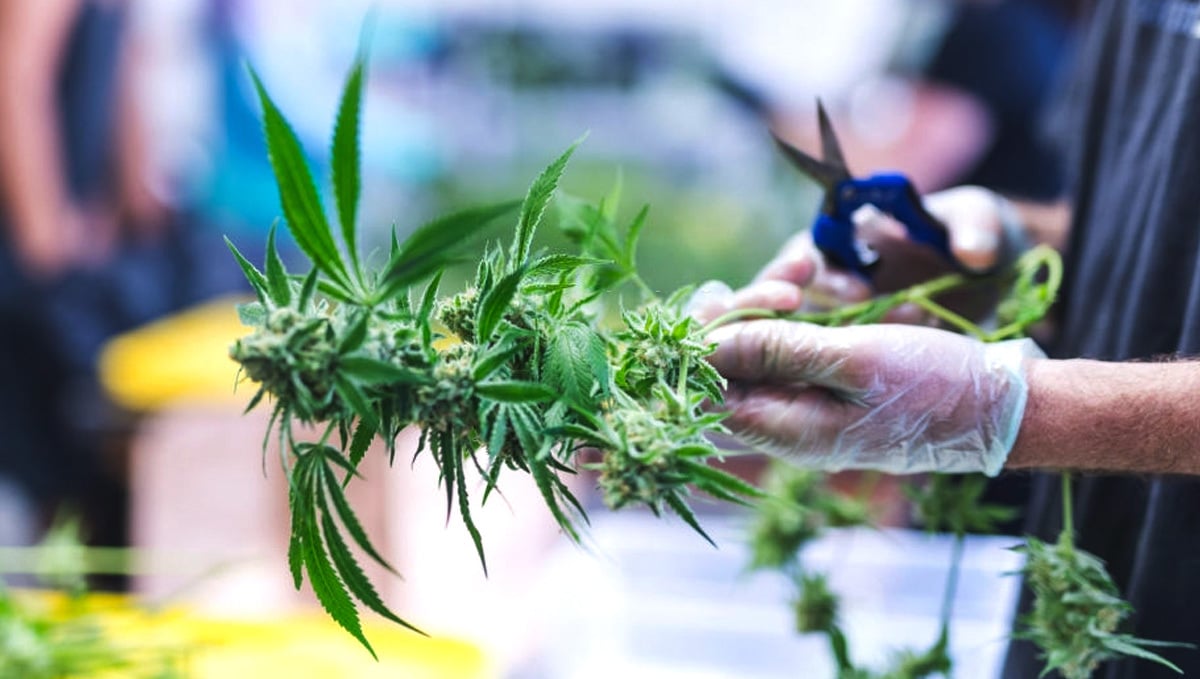
Second, handling your bud without gloves will make your hand sticky, this can become a problem and the resin is hard to remove.
Manicure scissors for trimming buds with precision
If you’re going to invest in scissors to prune your buds, look for trimming shears. They’re not expensive. The extra sharpness and precision will end up saving you time and avoid errors, leaving your buds looking way better.
A clean bucket or tray to catch the trimmed leaves
The tray or bucket is optional. Usually, growers who want to make extractions with the trim will trim their buds and collect the excess plant material in buckets or trays. This can also help you avoid all the cleaning up after trimming. Collecting the excess plant material in a bucket or tray as you go will save you from having to sweep and clean after trimming. If you are trimming large amounts of cannabis then you should consider investing in a “trim tray”. There are a bunch of options available these days. They work by incorporating a fine micron screen on the base of the tray. This micron screen allows only the trichomes that will fall from the buds you are trimming to pass through, and none of the plant material. It is actually quite surprising how many trichomes separate from the buds during trimming, and it is a real shame to waste these. With the help of one of these specific trim trays, you can collect a large amount of kief which can be turned into your favorite form of extract or concentrate.
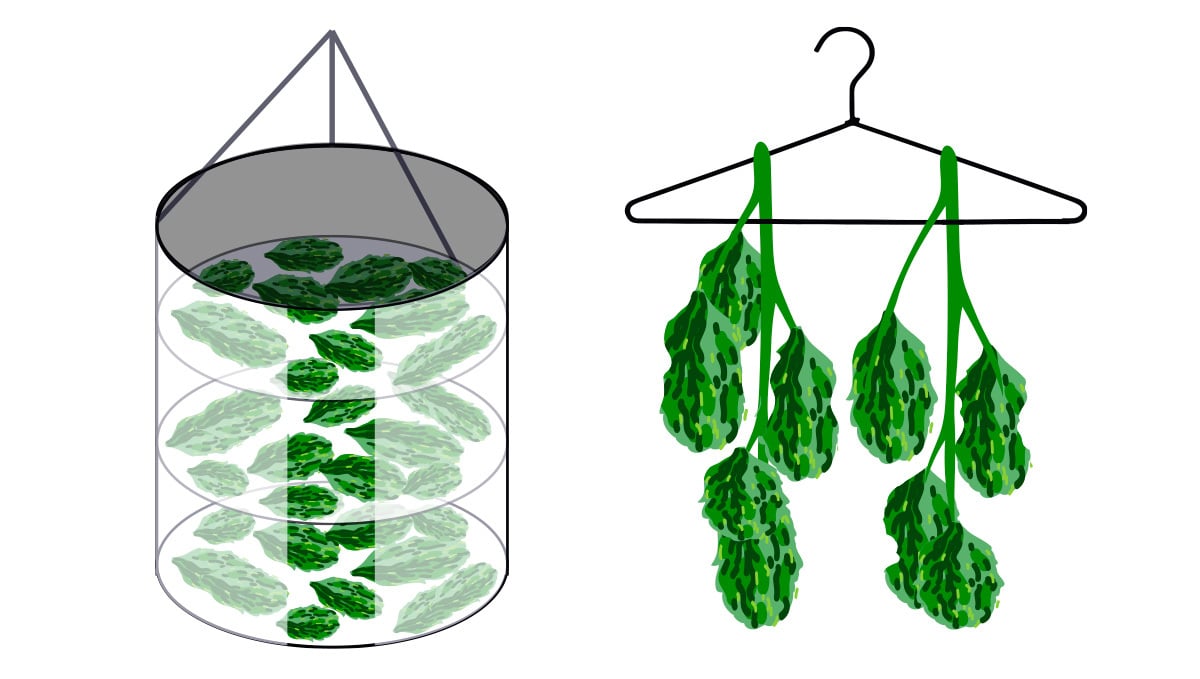
Another product you should definitely not try to save money on is your trimming scissors. That’s not to say you have to spend an arm and a leg, but trimming is a slow process, and getting the right pair of scissors or shears will make your trimming experience so much more enjoyable. With the right tools, you will be able to do a much better job and the final product will be of higher quality. Remember to keep some rubbing alcohol close at hand to regularly clean your shears, especially when dealing with the stickest of the icky. If you are trimming for flowers and not extracts, remember to never “shave” the buds. You want to use the tips of the scissors to get inside the buds and cut the sugar leaves as close to their base as possible.
Clothing hangers or drying nets to place the buds after trimming
You need a place to hold the trimmed buds after. Clothing hangers or clothing lines are used when you harvest the whole plant, drying nets are for when you remove the buds from the branches when trimming. This is up to you and it doesn’t matter which way you do it, you will need a place to place your buds while you haven’t finished trimming all.
3. How To Trim Your Buds?
Trimming consists of removing the excess plant material such as leaves and sometimes excess pistils to leave the bud looking good and appealing. In the trimming process, aim to take away everything that isn’t fully covered in trichomes. Try to create a uniform surface area around the buds, this includes removing pistils all the way to the foliage. Pistils have very few trichomes and should only be kept long for the looks.
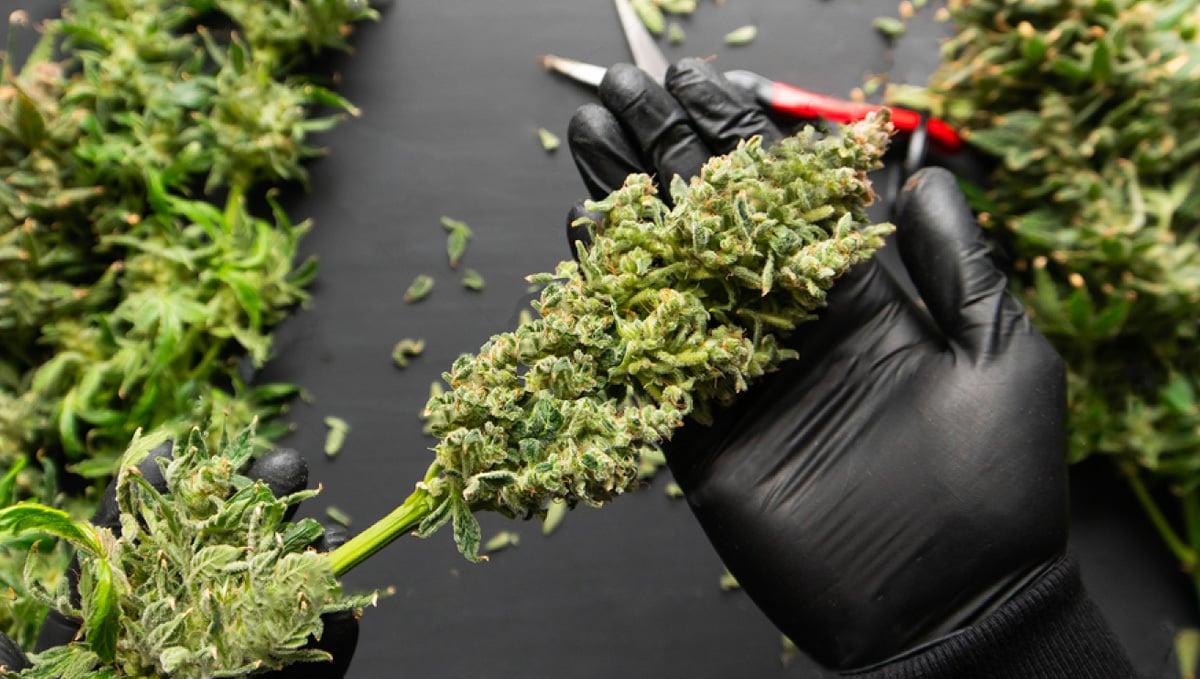
The way you’re trimming depends on the goal for that batch of flowers. It can be different if you’re making extracts, edibles or you’re smoking the flower. Usually, if you’re smoking the flowers, you want to trim the buds the best way possible, removing every excess possible. When using the buds to make edibles or extracts you want to trim a little bit less so you can extract all the trichomes possible, this is because you won’t see the flowers in the final product.
Wet Trimming vs Dry Trimming
Although there is an accepted best time to harvest cannabis, the best time to trim and manicure your cannabis is debated among growers. There are two ways to manicure them: wet trimming, and dry trimming. Some prefer wet trimming while others prefer dry trimming. Both are correct in certain circumstances, it all depends on things like time and the environment of the curing process, so it’s up to you do decide which one will work best.
Wet Trimming
Trimming your cannabis before drying is known as a “wet trim” because the leaves are still wet during the trimming process. This method is arguably the most preferred method for several reasons. Wet trimming gives you better access to your buds, the small leaves will be out due to their moisture content, making their removal an easy process.
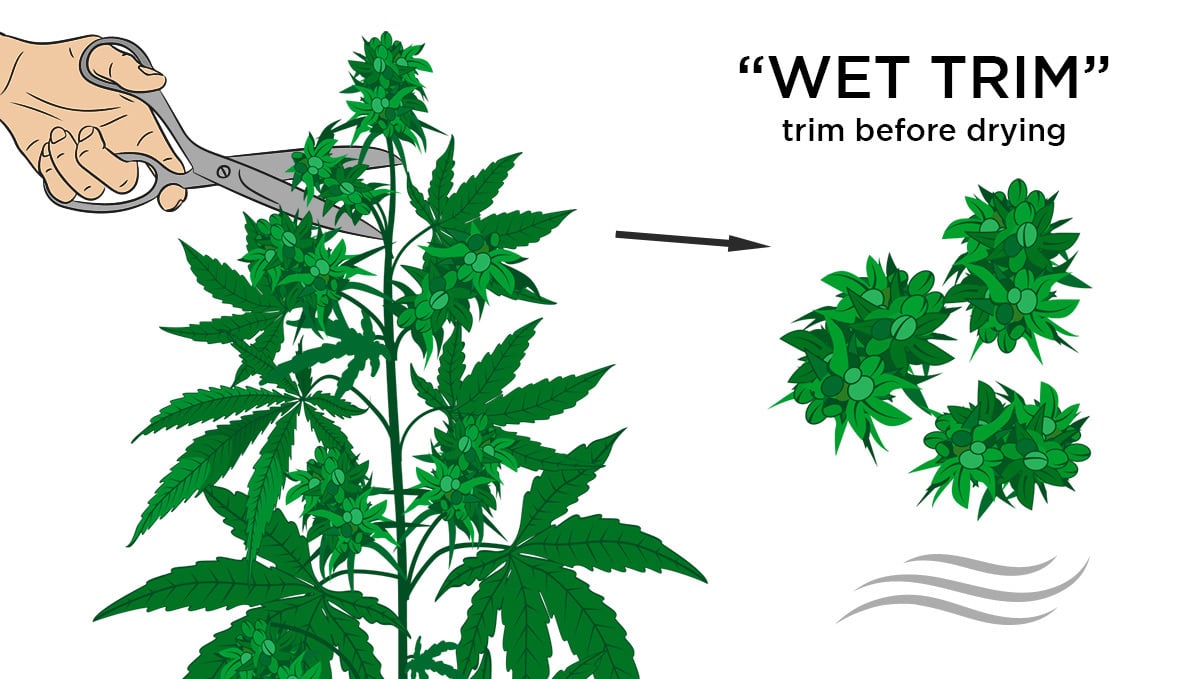
Drying buds extremely fast will leave them smelling like hay. Even though they will dry faster, you should not accelerate the process even more (e.g. by applying heat or fans facing directly onto the buds).
Wet trimming is better when:
- Your relative humidity is above 60%, and removing the excess plant material before drying prevents mold.
- You have a small drying space, removing the excess plant material will let you fit more buds in the same space.
- You want buds to dry more quickly, trimming leaves before drying will remove the excess moisture.
Dry Trimming
Dry trimming occurs after the drying process, this process can take 10-15 days, in this period buds will lose most of their moisture. Many growers prefer dry timing because it tends to be easier and less messy. Wet trimming can leave your hands and shears covered in resin very quickly, you will need a lot of cleaning breaks before finishing.
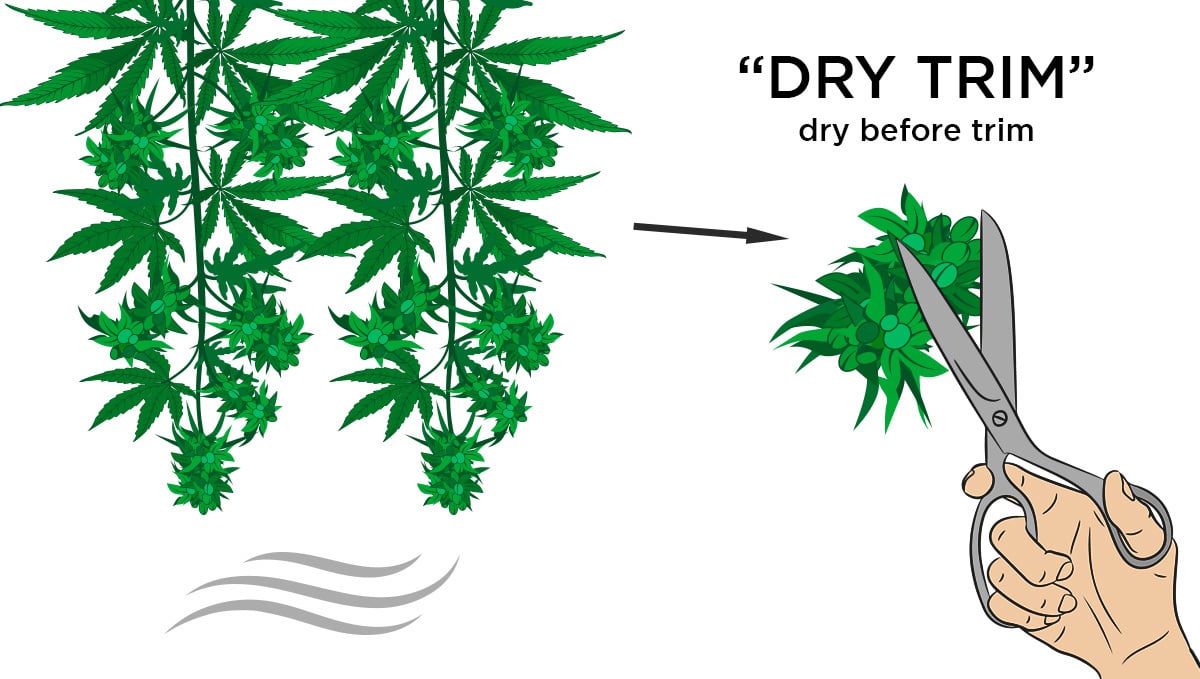
Dry trimming is better when:
- You’re not worried about mold.
- Your relative humidity levels are below 45%.
- You want buds to dry more slowly (drying buds too fast may cause them to smell like hay).
Trimming Machine
There are various trimmer models available, the most common ones work by introducing the buds into a machine where the leaves are removed and separated from the buds. Usually, trimming machines are used when you want to make extractions, edibles, or any type of cannabis product where people don’t see the buds. It is also used for trimming CBD buds.
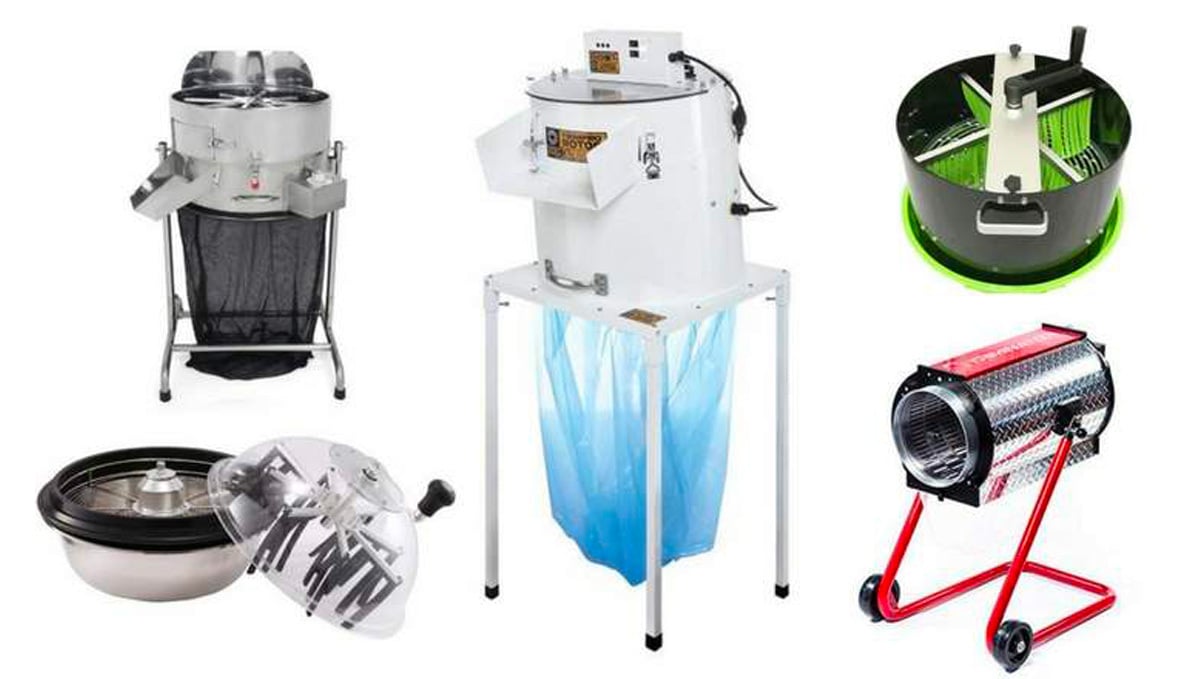
Using trimming machines is super easy and work-less. Although the buds won’t look as good as if you trim them by hand, this will save you a lot of time and can be helpful in some cases.
4. Disposing Of The Rest Of Your Plant
After you finished trimming your plant, you’ll be left with all the branches, roots, and other small parts of your cannabis plant. If you live in a place where cannabis is illegal you should be really careful. To prevent any problems, cut your plant into small pieces, and put it in a double bag. If possible, try not to throw it in the trash until the day your trash is picked up, this prevents people from going through your trash and accidentally finding the plant material. Another option is to chuck all the unusable trim into your compost heap. Cannabis wastage makes great compost material and can be used to feed your next crop!
To compost successfully, you’ll need to create a pile consisting of 50% green materials and 50% brown materials. Green materials are rich in nitrogen, whereas brown materials are high in carbon. Cannabis plant roots, leaves, stems, and branches fall into the category of nitrogen-rich green composting materials. You can add them to your pile with even amounts of paper, cardboard, or wood chips to set the stage for optimal decomposition. However, you can also put the leaves to good use. Some cannabis users like to add fresh cannabis leaves to their diet (provided they aren’t sprayed with anything), as they contain high levels of beneficial flavonoids. You can juice them, or even add them to a salad.
5. Tips For Trimming
Always use the tips of your scissors when trimming, this will keep your tools cleaner for longer. Save your trim for edibles or extractions. There is still a good amount of trichomes content in this excess plant material. The sticky residue left in your scissors and hands is a great way to try your freshly trimmed plant if you’re eager to try it. Also known as scissor hash or finger hash, it can be rolled into a joint.
6. In Conclusion
It really doesn’t matter how your buds look as long as you don’t have any problems with mold or your buds smell like hay. There is no correct way to trim and how you do it it’s almost entirely up to you, as long as you follow the basic guidelines. Trimming shouldn’t be a tedious activity, listen to some music and have fun, soon you’ll be trying your newly-harvested flowers.


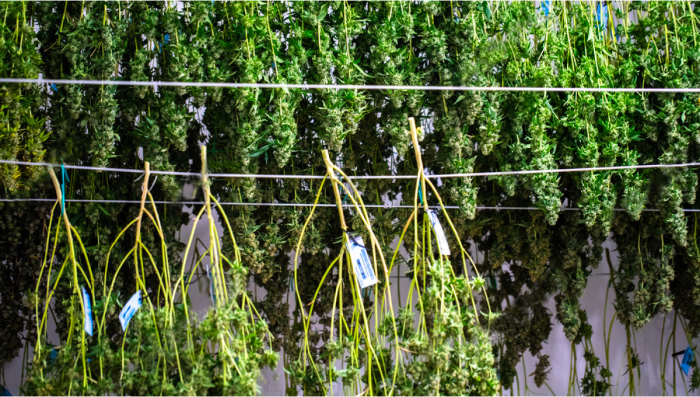







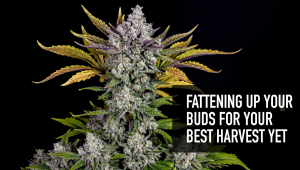
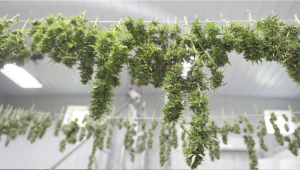
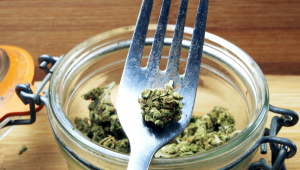

Comments